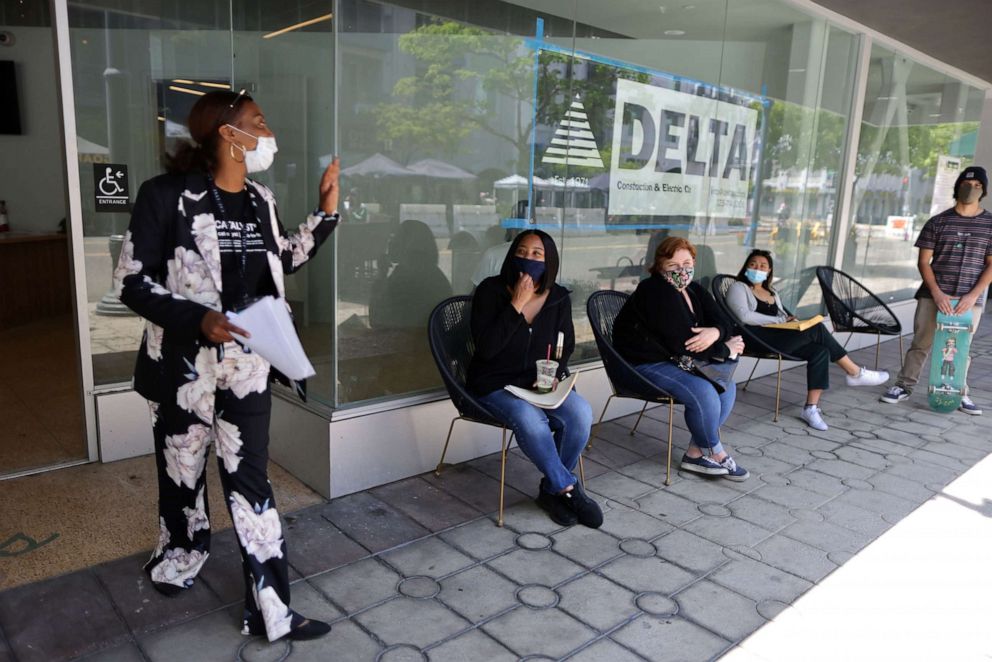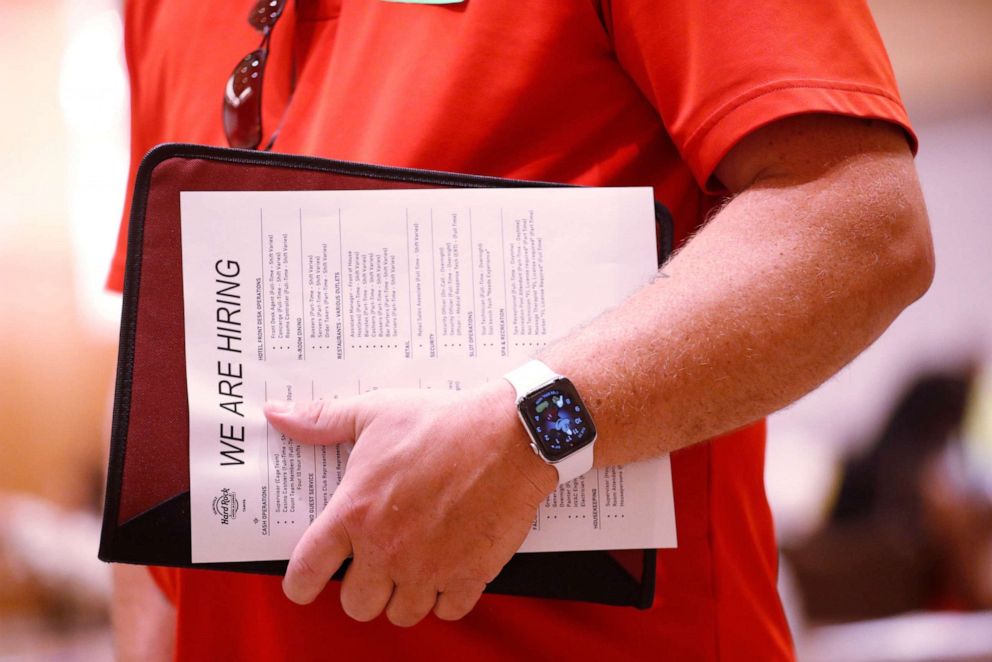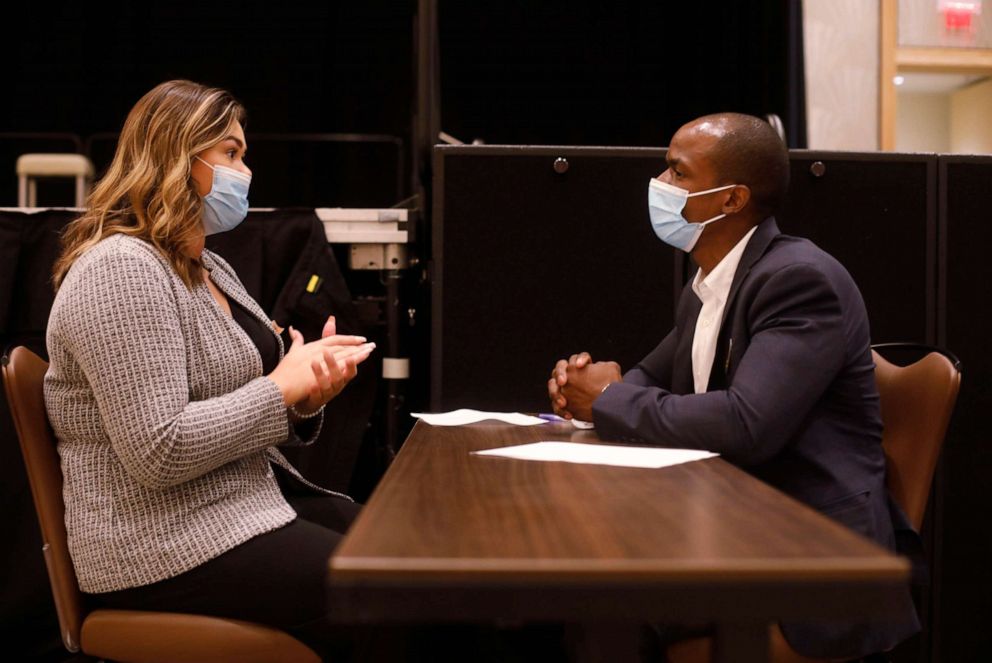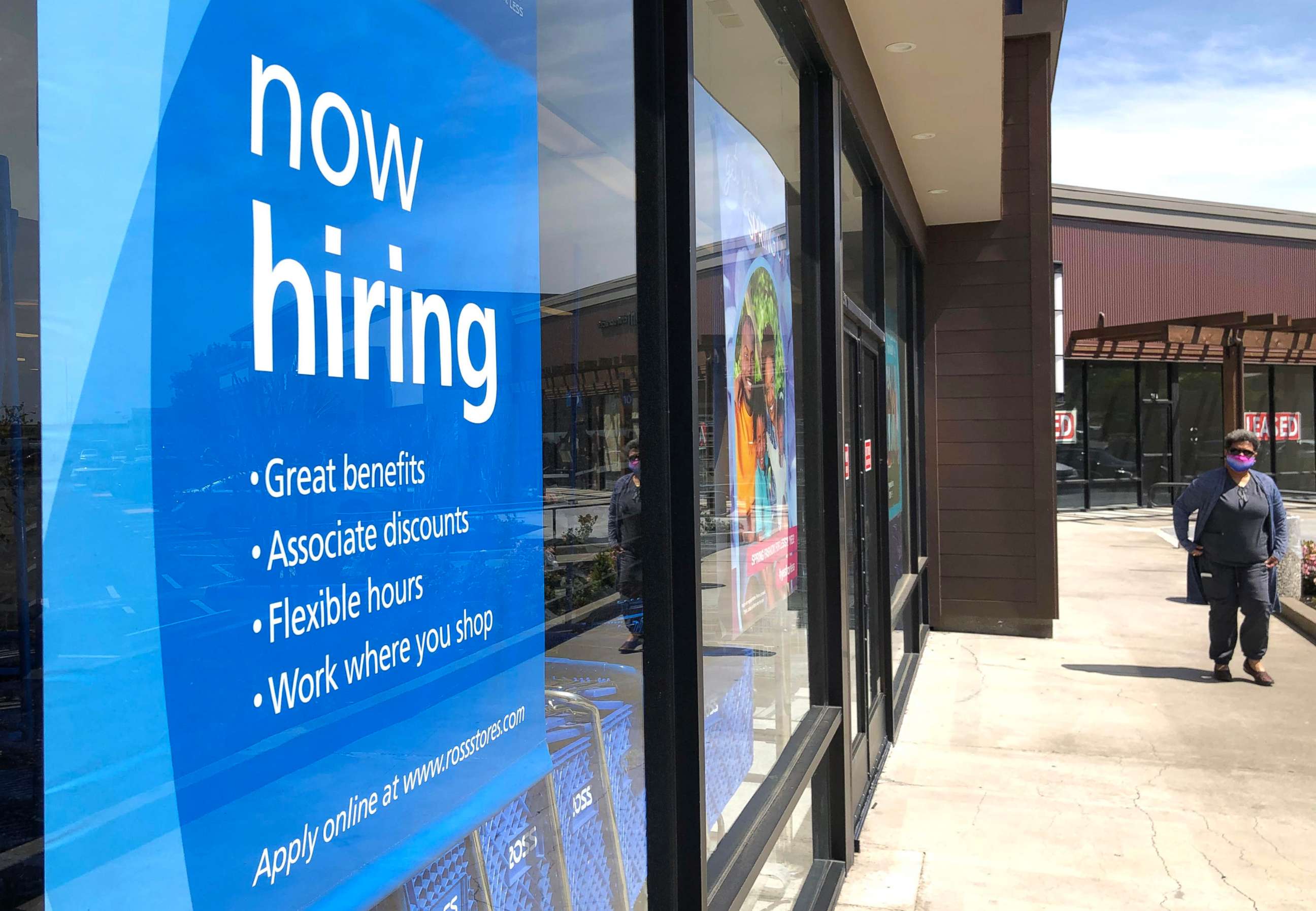Pandemic sparks labor reckoning for some: 'It's not just about the job anymore'
Some 66% of unemployed Americans seriously consider changing their occupation.
After the coronavirus pandemic forced much of the country to close down, pushed unemployment to levels not seen since the Great Depression, and left more than 593,000 Americans dead, some say the once-in-a-lifetime shock has forever altered their views towards work.
"I'm a spiritual person, so I feel like this was just the creator's reset button for us all, and that we're not supposed to come out of it the same," Tia Ferguson, 41, a mom of three from Columbus, Ohio, told ABC News. "It's not just about the job anymore, it's about the truest sense of vocation."

After living through more than a year of calamity -- marked by seemingly endless news of sickness, death and economic anguish that further divided the haves from the have-nots -- many appear to be changing their mindsets about work and life.
For some, this means changing jobs or even careers. For others, it means not accepting toxic work environments or other conditions they had to endure prior to the pandemic. In many cases, the dramatically expanded unemployment benefits afforded the jobless, including self-employed people and others not previously eligible for benefits, the time and space to make these realizations and pursue changes.

It also galvanized the need to pursue protections for frontline workers in sectors like restaurant and hospitality such as minimum wage, collective bargaining and other protections, according to advocates.
Like millions of others, Ferguson was furloughed from her job, as a substitute teacher, in March 2020. Now, as the pandemic eases in the United States, she says she is not looking to go back to the way things were before but is focused on launching her own literacy tutoring business.
"My passion is truly for education," she said. "As a mom, I want to make sure that not only my children, but as many children as I can reach have those foundational reading skills so they can be successful in life."
Ferguson is not alone in her desire for career change. Some 66% of unemployed adults said they have seriously considered changing their occupation or field of work since being laid off, according to data from the Pew Research Center released earlier this year.
Separate data from Microsoft's annual Work Trend Index report, released in March, found that 46% of the some 30,000 study participants in workforce is planning to make a "major pivot or career transition." A year prior, data shows a majority of people said they hope to be at their same employer for two years.
"With so much change upending people over the past year, employees are reevaluating priorities, home bases, and their entire lives," the report stated. "So, whether it’s due to fewer networking or career advancement opportunities, a new calling, pent-up demand, or a host of pandemic-related struggles, more people are considering their next move."
'It took them to terminate me to realize my worth'
LaShanta Knowles, 33, from Cleveland, told ABC News she was terminated from her job doing data entry work for a relocation company in September 2020 due to the pandemic after having worked there for seven years. Now, she is focused on launching her career as a graphic designer.

Her previous employer has not asked her to come back, but even if they did, Knowles said she is not looking to return because of the work environment.
"I appreciate my experiences from my previous employer," she told ABC News, "but unfortunately I was only called out whenever I did something wrong. I rarely got any feedback when I did something right."
"And over the course of seven years, it has definitely lowered my self-esteem," she said. "It took them to terminate me to realize my worth."
After over a year of languishing amid the isolation and uncertainty of the health crisis, many others are similarly rejecting working conditions they endured in a pre-pandemic world that they say glorified "hustle culture" and overwork. Microsoft's Work Trend Index data found 1 in 5 respondents said their employer doesn't care about their work-life balance, 54% feel "overworked" and 39% feel "exhausted."

One in five global survey respondents say their employer doesn’t care about their work-life balance. Fifty-four percent feel overworked. Thirty-nine percent feel exhausted.
Some 41% of the workforce is likely to consider leaving their current employer within the next year, according to Microsoft's data, and the figure rises to 54% for Gen Z respondents. Data from the year prior shows a majority of workers (71%) said the opposite -- that they plan to be with their current employer in two years.
In addition, data from Prudential's Pulse of the American Worker survey released in April found that 46% of respondents said they either switched jobs during the pandemic (20%) or plan to look for a new job when the threat of the pandemic decreases (26%).
Microsoft's report warned business leaders are "out of touch with employees and need a wake-up call." A statement accompanying Prudential's findings warned that a "'war for talent' may be looming if companies don't address workers' needs."
Unpacking the fallacy of 'no one wants to work'
Ferguson and Knowles said they have been receiving unemployment insurance since losing their jobs and have spent the time acquiring new skills to support their new careers. Ferguson is taking bookkeeping classes at a community college and incorporated her LLC in April. Knowles is set to receive a certificate for web programming in June and has spent time volunteering for a local nonprofit as well as building up her graphic design portfolio.

"It is not that people aren't willing to work, it's that many people haven't really found their purpose," Knowles said of those receiving unemployment benefits during the crisis. "And so I feel like maybe during this time, the pandemic has actually given people a chance."
Some GOP lawmakers have pointed to a labor shortage in the restaurant industry as evidence that enhanced pandemic unemployment benefits are deterring people from finding work -- arguments largely refuted by economists and data.
A working paper published in March by the National Bureau of Economic Research found that Federal Pandemic Unemployment Compensation (FPUC) "did not decrease employment." The researchers noted that a 10% increase in unemployment benefits caused a 3.6% decrease in job applications, but this ultimately resulted in "decreased competition among applicants at a time when jobs were unusually scarce."
Heidi Shierholz, a former chief economist at the Department of Labor and the current senior economist and policy director at the left-leaning Economic Policy Institute think tank, pointed to a caregiving crisis, lingering health fears and low wages as contributing to the restaurant industry's staffing issues. She added, however, that the sector's "isolated" labor shortage is "not driving things economy-wide."

For someone like Ferguson, who's physician ordered her not to work amid the pandemic due to preexisting health conditions including diabetes and hypertension that put her at higher risk of COVID-19 complications, the unemployment insurance during the crisis could mean the difference between life and death.
Some restaurant workers may also still be shell-shocked from the economic and health toll the pandemic took on the industry and its workers seemingly overnight, as their sector bore the brunt of initial job losses while many of their office-working peers had the privilege of continuing work remotely. Finally, wages in leisure and hospitality remain "extraordinarily low, even with the recent acceleration," Shierholz added, which might not be seen as enough for worker's to risk their health or pay for alternative childcare.
Shierholz slammed the decisions of some Republican governors to cut back jobless aid because of the labor shortage in the restaurant industry, lamenting how quickly people shifted from calling workers heroes to calling them lazy.
"It's like we went from, 'These are essential workers, they're keeping us going,'" she said. "And now there's a 'We are going to make sure that you are so desperate that you have no choice but to take a job, even if it's dangerous for you, even if wages are very suppressed, even if that means you have an enormous amount of stress and strain added to your life because of trying to cobble together fragmented too-expensive childcare.'"

Ultimately, Shierholz said the shift underscores the need for policy change -- such as raising the federal minimum wage that hasn't budged in a decade or passing the Protecting the Right to Organize (PRO) Act which adds penalties for companies that violate workers' rights and strengthens workers' ability to collectively bargain with employers.
What it takes to build the 'new normal'
While anecdotes point to a reassessment of work in the wake of the pandemic, Shierholz argues that without policy overhauls, the "new normal" will likely end up looking the same as it did before the pandemic when workers may have felt more beholden to jobs they have since lost and a business-as-usual mindset that psychological effects of the pandemic disrupted.
In the aftermath of the financial crisis of 2007-2008, Shierholz said the push to combat inequality and reassess work conditions in the U.S. was on fire.
"Everyone was talking about, 'This is the new normal, things are totally different now,' acting like there was going to be just fundamental change as a result of the Great Recession," she said. "And when you look back, in 2019, at the peak of the expansion following the Great Recession … it's actually hard to come up with things that are fundamentally different."
"I don't have any reason to believe it's going to play out different this time," she added, "unless we get this big policy push to strengthen workers' rights, that would make a big difference."
Knowles feels differently, noting that the pandemic was the catalyst for her career change.
"I understand that the pandemic was very detrimental to a lot of people, but for me personally, I felt that it gave me a chance to embark on something that I have put aside for so long," she said.
With her unemployment benefits set to expire soon, Knowles says "all I can do at this point is keep hope alive."
Ferguson encouraged others to not give up on being the person they truly want to be or doing the work they truly want to do.
"I just want people to know that as much as the pandemic has been really, really hard on us, we've lost so much people, there really is light at the end of the tunnel," Ferguson said. "If we choose to go towards that light, we can choose to be a better version of ourselves."




